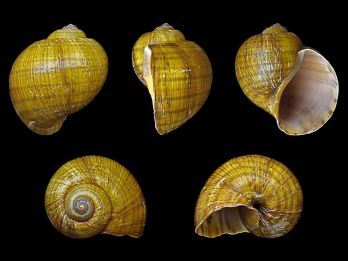Golden apple snail
The golden apple snail, or channelled snail (Pomacea canaliculata), is regarded as one of the most serious invertebrate threats to the Australian rice industry.
Background
This species, which is native to South America, was introduced into Asia for aquaculture and the aquarium trade. It escaped into the broader environment and spread throughout eastern Asia, now present in Indonesia and Papua New Guinea.
There have been many interceptions of the golden apple snail entering Australia. In most instances, the spread has been facilitated by the aquarium trade.
Restrictions on importing both live snails and water plants that may harbour snails should be strengthened where possible.
Impacts
The golden apple snail has a wide host range, and it will likely feed on many Australian aquatic and semi-aquatic plants.
This species would be able to colonise wetlands throughout eastern and northern Australia, where it could have a devastating effect on natural ecosystems.
Golden apple snails have both gills and an air breathing organ. Their ability to breathe in oxygen allows the snail to survive between irrigation cycles.
Identification
Golden apple snail colour is variable, often golden, yellow or brown. They are large when mature, with a shell diameter of 3 to 8 cm.
These snails have a distinct flat operculum carried on the back of the body behind the shell. The operculum is pulled inwards to seal the shell when the animal withdraws inside.
The most recognizable sign of apple snail species is their bright-pink egg masses, which are noticeable enough to be seen from a moving vehicle. The egg masses are laid on emergent vegetation, such as:
- wetland crops
- other hard surfaces above the water line (e.g. rocks, logs and bridge supports).



